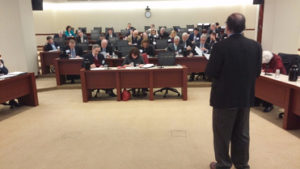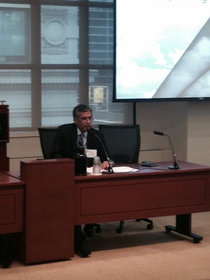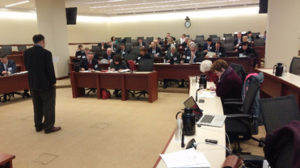Over the course of three years, the Alliance for Regional Development has promoted the Chicago Tri-State Metropolitan Area OECD Review on both the national and international stage, convened stakeholders from around the region, championed projects and initiatives that will help grow the regional economy and hosted two Summits on Regional Competitiveness with the Federal Reserve Bank of Chicago. All of this success would not have been possible without the support of over 130 Working Team members and the Alliance funders. On March 9, Alliance leadership invited participants to share their thoughts during a strategy session to determine the future direction of our regional endeavors.
The meeting was facilitated by Ed Morrision, Regional Economic Development Advisor, Purdue Center for Regional Development, with a welcome by Alliance President and CEO Kelly O’Brien and Alliance Wisconsin Chairman Paul Jones, and remarks by honored guest Tom Guevara, Deputy Assistant Secretary for Regional Affairs, U.S. Department of Commerce Economic Development Administration.
In his remarks, Deputy Assistant Secretary Guevara underscored repeatedly that zero-sum games in competitive regions do not help the goal of economic development, and that the most successful regions such as Silicon Valley focus on ensuring that all parts of the region rise together. He said that Alliance stakeholders should be asking themselves who the cross-sector leaders will be who will step up and guard against zero-sum endeavors, ease collaboration, share resources, and engage in regional network-building endeavors.
Deputy Assistant Secretary Guevara also noted that the region is underperforming. He emphasized the need for scalable projects that show promise of much larger growth, as well as replicable, long-term models. The most powerful projects should also show impact across state lines, offering near-term economic benefit while continuing to get people used to collaborating across borders.
He further said that culture change takes time, and envisions a two-to-three year process of building a foundation to be ready when major project opportunities come along that show significant promise. He noted that the process will be messy, but that that’s part of figuring it out, and it’s what successful businesses and regions do when they work together.
Tom Guevara, Deputy Assistant Secretary for Regional Affairs, U.S. Department of Commerce Economic Development Administration
Ed Morrision, Regional Economic Development Advisor, Purdue Center for Regional Development, leading Strategic Doing discussion
To gain input from Alliance stakeholders, Morrison engaged participants in a guided Strategic Doing discussion around two key questions:
- Has the Alliance accomplished what it was created to do in regard to the OECD Review?
- Should there be a “2.0” with further regional collaboration goals?
Participants were also asked to write their discussion answers down on special Strategic Doing handouts.
Morrison noted that a “2.0” requires identification of funding streams and asked participants to consider whether we are going to invest in ourselves. The response from participants was enthusiastic.
“Keep the momentum going, because it is extremely important that this regional Alliance continues,” said Dave Ryan, Executive Director, Lakeshore Chamber of Commerce. “For three states and their Governors to get where you are today in a relatively short time is amazing.”
Significant, implementable impacts were identified as key to successful fundraising. However, some participants noted that it felt premature to discuss budget numbers before knowing what the Alliance will look like moving forward in terms of structure and focus areas. A reasonable budget for an additional year of work is likely in the range of $300,000 to $500,000. Morrision made clear that no funding commitment is being sought yet.
Potential 2.0 focus areas were discussed, with the consensus that the Alliance would need to move beyond discrete projects in individual subject-area silos to a more holistic, interdependent agenda. Such a broadened agenda would free leadership to engage more fully in development work. Morrison also suggested an “opportunity fund” might be needed to ensure the Alliance is ready to move forward when promising, sustainable project ideas arise.
Participants also discussed the ground-breaking nature of the Alliance, bringing together numerous business leaders, agencies, and universities across state lines in a manner without precedent in the Tri-State Region, and producing first-of-their-kind economic development tools that have gotten people jobs and will make regional transportation funding requests easier to coordinate.
It was also noted that no single actor–either from the private sector or government–would have been able to accomplish as much without a neutral platform such as the Alliance, and that, in fact, no one was addressing the OECD’s concerns regarding the region prior to the Alliance.
In closing, Morrison noted that next steps may include bringing the Working Teams together to determine a specific agenda, developing a strategic action plan to determine focus areas, governance, and staffing.
Richard Longworth, Senior Follow, Chicago Council on Global Affairs, said, “I thought that was a very good session; clearly there’s still a lot of enthusiasm for the Alliance.”
Additional information, including answers collated from the Strategic Doing handouts, will be made available.



